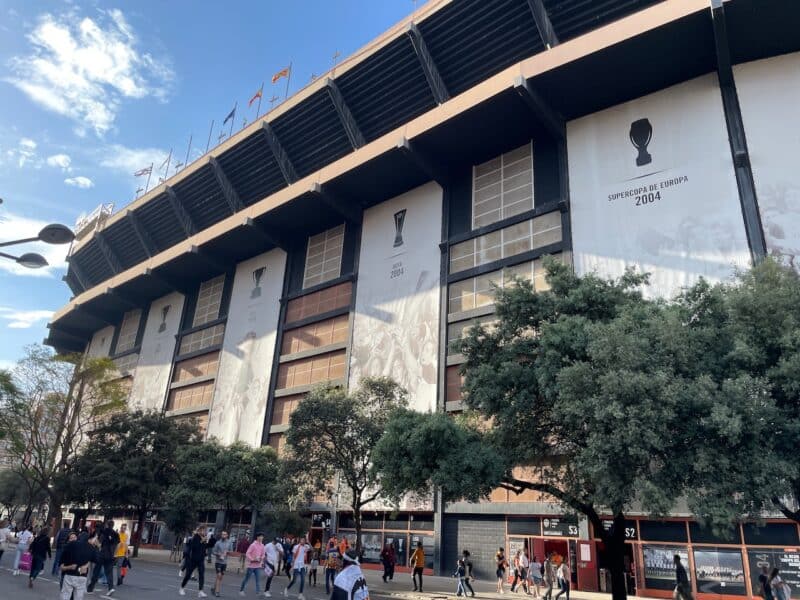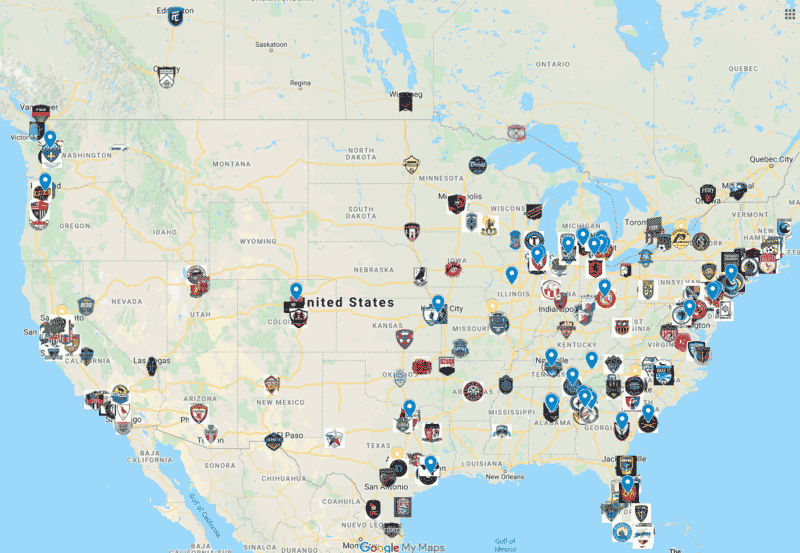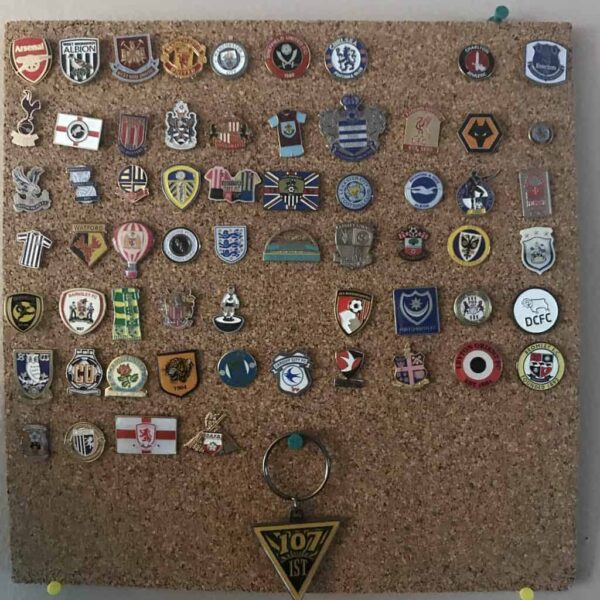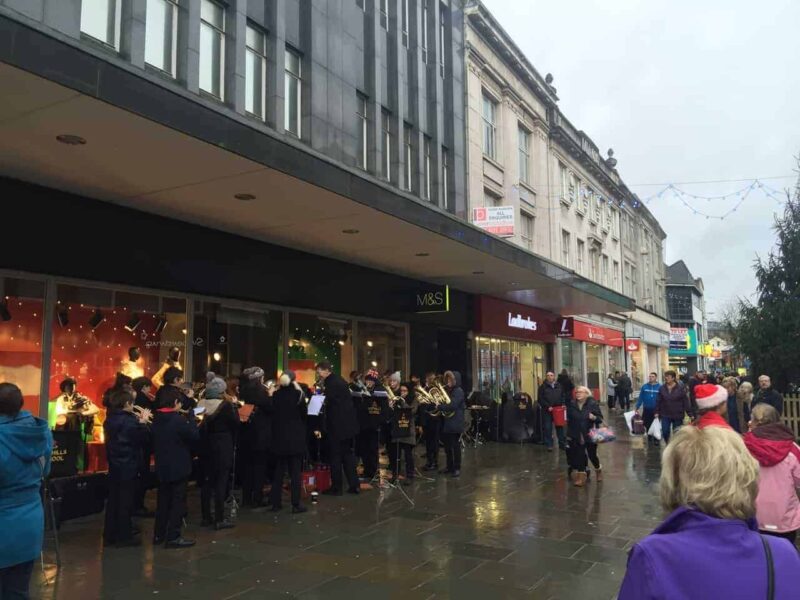In the spirit of international breaks (see also my my trip to a game in Barcelona),…
In Valencia, Yes They Can?

In Valencia, two clubs trying to accomplish different things share one thing in common: the belief that ¡Si se puede!
At the big and famous club, they are fighting for survival. At the smaller one, known and supported by far fewer, they are aiming for greater heights. And while neither of the Valencia clubs are likely to puncture to moneyed wall that keeps them below the top of La Liga, residents of Spain’s third-largest city are nonetheless starting to believe that this season could at last deliver the goods – or at least not the really bad.
Sunday, Estadio Mestalla
The folks at Valencia weren’t sure when to start chanting Si se puede, as football supporters are a notoriously superstitious lot. They began the night 18th of 20 in La Liga, in the relegation zone, at risk of dropping into Segunda Division for the first time since 1987. In fact, that season was their only one in the second tier since the Civil War ended in 1939. So, as one could also gather from the size of the stadium and crowd, much less the gallery of trophies pictured on its walls, this is not a club that sees itself as second-tier.
And they are not. Valencia, founded in 1919, have won the league six times (most recently in 2004), the Copa del Rey eight times, and the Europa League twice. They were in two Champions League Finals in 2002 and 2001. The problem, certainly in the eyes of the supporters, is a familiar one: poor ownership in the form of a businessman from Singapore who is regularly told, in the 19th minute of each game, to go home. (Read all about it here from the BBC.)
So when 16th-place Real Valladolid pounced on an early terrible mistake by Valencia’s big centerback, Mouctar Diakhaby, Canadian Kyle Larin rolling in simply for a 1-0 lead, all that fear and anger and crazy came pouring out of the 42,000-person crowd. The team bench must have felt it, even anticipated it, because they were out of their dugout, clapping and encouraging their peers on the pitch, almost as fast as the purple-clad visitors leapt out of theirs to celebrate. Diakhaby was visibly shaken, shouting at himself just before the ensuing kickoff.
A few minutes later, a Valladolid player picked the ball up at midfield and lashed at it. For a moment, we all wondered why, then we saw Valencia’s keeper running backwards, then we realized he wasn’t going to get it, then he gave up and we all waited together, then the net bulged – but it was the roof. For just a moment, the sense of relief was such that many people laughed, like we all briefly realized the ridiculous nature of our situation.
Midway in the second half, the soccer gods cued up the almost inevitable Act II. Valencia got a free kick from a good spot, the ball went in, and Diakhaby rose from the crowd like he was being pulled out of it. He headed it down with purpose. The keeper moved over and seemed sure to save it, but then – because it must have been written in the stars – he literally put his hands up and let it go, apparently because he thought it was wide. But it wasn’t. It went in!
When the lucky equalizer went in, there was shock and joy, pandemonium even, but not what you could call optimism. More of a desperate, frantic “Vamos!” running through the crowd. We had moved from fear to panic, like in the dream when the shark is coming and you’re next in line for the ladder onto the boat.
Valencia pushed and pushed, they threw on more attackers, and the crowd counted the minutes with nervous glances at the clock. Every move had everything hanging in the balance.
And then one of those substitutes, a big lanky 20-year-old named Javi Guerra, got the ball maybe 25 yards out on the right. He moved to the center of the pitch, then slid further left. I was looking for his passing options when he seemed to chip and drive the ball at the same time, back across his body with his left foot, and from where I sat, it was clearly going for the goal. I saw a the goalkeeper’s arms flash go by, then the net bulged, and the crowd exploded. Strangers hugged, men embraced and wept, kids covered their ears, players poured onto the field and formed piles.
When that settled down, the chant came up, now without reservation: “Si se puede! Si se puede!” Yes we can. We can beat this. The last few minutes were half singing, half whistling, and all of it so loud we couldn’t even hear the final whistle. Our cue to celebrate was that the players threw their arms up and began running around in circles. So we pretty much did the same.
Afterwards, as the stadium cleared out and the relief and joy poured out into the streets, a crowd of us who had seats near the locker room entrance waited for the hero of the night to finish his on-field interviews, and then his club-enforced selfie video message, and then a few hugs with a few suits … but then, instead of heading for the tunnel, he turned and ran back onto the field. He was a substitute, after all, so he still had some running to do, with the other subs and bench warmers. Because hero or not, he was still at work, and at Valencia, there was still work to do.
Saturday, Estadi Ciutat de Valencia
Even the name tells you a lot: Valencia City Stadium. Officially the home of Levante, but not owned by it. There are no trophies pictured outside, because they haven’t won any, unless you want to count the second tier and a cup that doesn’t exist anymore. The neighborhood is working-class, and the “fan zone” outside consists of a couple of food trucks set up in a fenced parking lot next to a department store. Welcome to what Valencia is trying to stay out: La Liga 2.
I was there on an official visit, hosted by the club’s new ticketing director, hired from Valencia as it happens. Her job seems to be upgrading the fan experience at Levante, and I was there to experience the hospitality. I’ve done this in a lot of places, many of them glamorous, some of them Stockport County, but in this case, down here in Liga Dos, I didn’t have a proper ticket, the people in the ticket office didn’t have my name, and I couldn’t get to the main office because it was blocked off in anticipation of the players’ buses arriving.
So I set up shop in the fan zone and waited. A small but vocal crowd was gathered, and larger than usual, as Levante – the name actually derives from the Spanish word for sunrise – are working on a different goal: rising. They’ve been a yo-yo club for years, and this season they are locked in an epic struggle for promotion. As kickoff approached, they were in a playoff spot, but a win would put them second and in line for automatic promotion. And who was in town? Just the team currently in second, Alavés.
The visiting bus arrived to the usual whistles, middle fingers and insults. But the home bus parked out on the street so the players could walk in, all smiles, to slap hands with their singing, bouncing, scarf-waving admirers. The song that greeted them had something to do with huevos, a slang reference to balls.
For me, though, it turns out that, down at this level, if your name isn’t on the list and you can’t get to the office, you just walk around the fan zone until you bump into the club ticket director. She was out there showing some other people around, and after we chatted for a minute, the office opened up and somebody walked me over to the hospitality area, where waited seats, food and drinks.
Also on show, as a sort of comic diversion, was the lovely young woman in a slim fit dress with club color bands in her hair, stationed at the suite entrance to check wristbands, and the poor thing having to indulge a series of middle-aged men stopping by to “chat” with her. One of them, a stadium worker with an orange vest draped over a round belly, was particularly chatty, his efforts and her increased indifference somehow encapsulating social and class relations throughout history. I was in purely as a guest; he had no chance at all.
The crowd of some 25,000, bigger than usual and nearly a sell-out, was primed for the occasion: flags had been handed out, and whether it was normal or not, the words to the club anthem were put up on the video screen. Everyone sang along and waved their flags, and then Levante basically went out and kicked the crap out of Alavés.
The opener was a belter, volleyed in off the crossbar from about 20 yards, and the second a routine header off a corner:
It finished just the 2-0, but it was quite simply their day, and one filled with a large portion, even for Spain, of diving, rolling, arm-waving and referee-stalking. The drama factor was very high, the suspense in terms of outcome not so much.
The win put Levante second, in line for automatic promotion, ahead of Alavés on goal difference. With just a few games to go, the crowd clearly believed, and took up the chant of the week, “Si se puede! Si se puede!”
One team with a dream of rising, another with a nightmare of falling, both currently believing because both got their result at home.
From my perspective, the business mind says that here is a lovely city by the sea – the home of both paella and horchata, by the way – with two clubs to visit, both of which might be in La Liga next season. Valencia is a much bigger club than many outside Spain will realize, with one of the best stadiums and atmospheres I’ve experienced in the country. Levante is a community club with ambition, and a lovely hospitality option with killer seats, plus a new ticketing director trying to raise their game. I would love if it they both succeed and we can help people get to both of these stadiums.
My heart, meanwhile, hopes they both go up so they can play each other twice next season, but also just because I like being around when belief is realized and dreams come true.













Post Comments